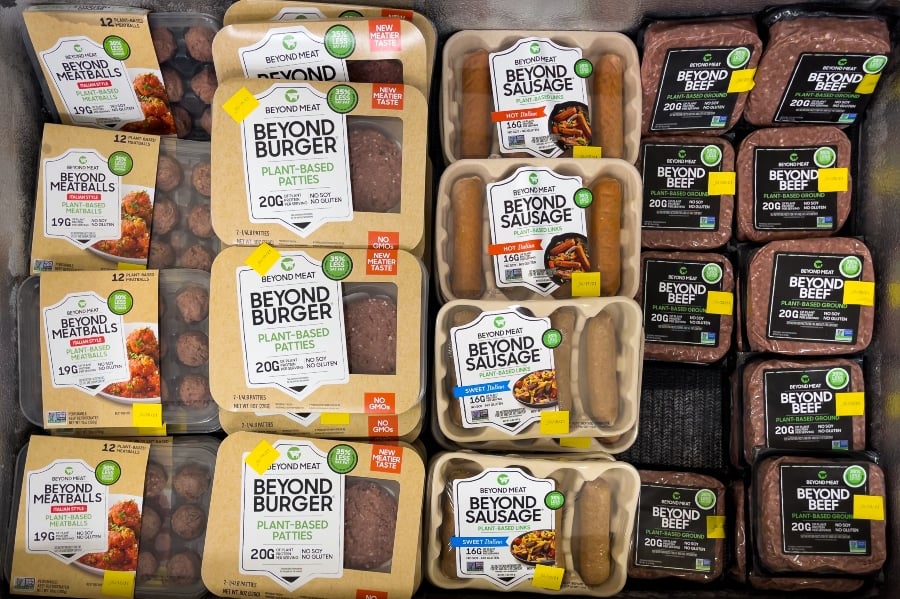A new report has urged nutrition scientists to stop using the term “ultra processed” when describing vegan meat alternatives.
Originally coined to identify foods manufactured in factories by large companies, ultra-processed food (UPF) has since become shorthand for “unhealthy.”
Published this week, the report, titled “Processing the discourse over plant-based meat,” takes aim at how language around UPFs “is approaching a point of hysteria, has become worryingly detached from nutrition science and is at odds with health and sustainability goals.”
Jenny Chapman, food systems researcher and author of the report, told Plant Based News (PBN): “The UPF categorization simply tells us that, like so much of the food we eat – tofu, hummus, oat milk, wholemeal bread – plant-based meats are made in factories. It is unable to tell you if a food is healthy or not – that’s not what it was designed to do.”
Misleading term masks real impacts of food
In the midst of a climate crisis, animal agriculture industries are seeking new ways to market their products. The meat industry is still producing “alternative science” to make dubious claims about its environmental impacts. However, much of its focus has now switched to health messaging.
Its use of the “ultra-processed” label to discredit vegan foods is a potent example. Through misinformation and simplification, a dangerous stereotype has taken root, the report notes.

Chapman points out that the “ultra-processed” label does not accurately reflect how healthy a food type is. “Messages such as ‘avoid foods with more than five ingredients’ are unhelpful and misleading,” Chapman states. These types of confused “rules” are turning consumers away from more nutritious and environmentally friendly plant-based foods, she suggests.
Last year, a major international study found that plant-based meats are not associated with an increased risk of cancer, heart disease, and type 2 diabetes. Researchers found no link between “ultra-processed” vegan foods and these diseases, unlike “ultra-processed” meat products, which did have significant links to all three.
“Despite significant limitations of the subjective definition of “ultra-processed food”, attempts have been made to conduct studies into health using it. This has, quite understandably, resulted in widespread confusion both within and outside the nutrition science community,” said Chapman.
Switch attention away from ultra processed
In the report, Chapman suggests a series of actions to clarify messaging around healthy and sustainable foods.
These include training chefs in plant-based cooking, promoting plant-based meat in the media, and funding research to make vegan alternatives more affordable. Education aimed at schools could also help improve understanding of sustainable diets.
One challenge to overcome is the powerful interests of the meat and dairy industries. Last month, the Agriculture and Horticulture Development Board (AHDB) launched a new campaign aimed at promoting meat and dairy. Many of the ads promoted red meat, which is linked to a variety of health problems. Health bodies, including the UK’s National Health Service (NHS), recommend limiting red meat consumption.
Chapman stresses the need for clear, science-based communication. “To evaluate the role a food plays in our wider diet we have evidence-backed nutrition profile systems,” she told PBN. “The evidence from these is clear – plant-based meat is healthier than the processed meat products it intends to replace.”

The climate impact of meat and dairy
Evidence of the devastating impacts meat and dairy have on the planet are becoming ever harder to ignore. Animal agriculture contributes at least 16.5 percent of global greenhouse gas (GHG) emissions. It is also responsible for other major environmental and health concerns such as soil degradation, water pollution, and antibiotic resistance.
Last month, the European Scientific Advisory Board on Climate Change suggested moving funding away from animal agriculture towards “lower-emitting products and activities.” Similarly, in the US, more than 250 experts wrote to the Secretary of Agriculture urging the government to address high meat consumption in the country.
Experts including Dr Tedros Adhanom Ghebreyesus, Director-General of the World Health Organization, and much-loved British broadcaster Sir David Attenborough have joined the calls for a plant-based transition. Countries like Denmark and Germany have already made steps towards a plant-based future.






